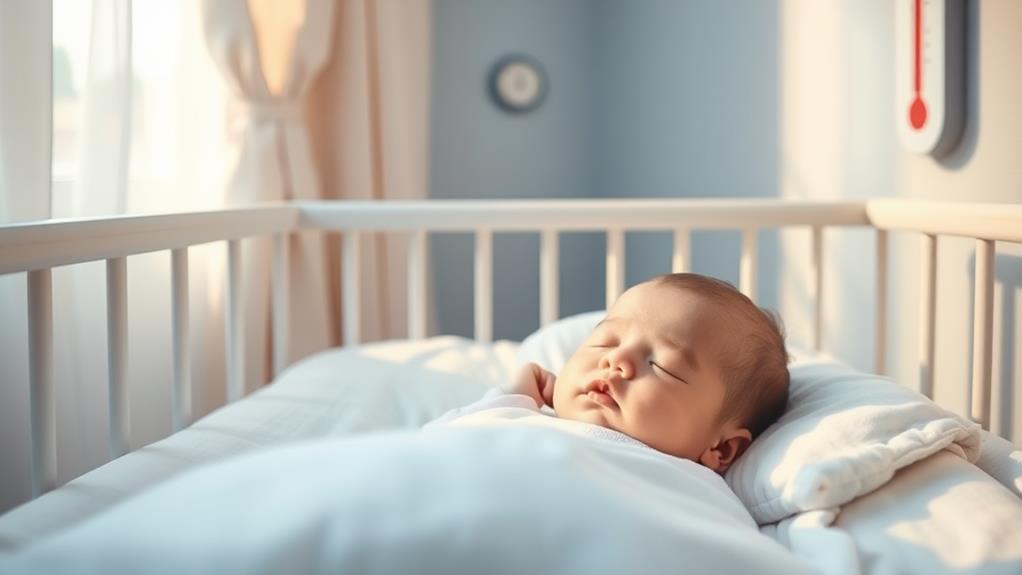If you've noticed your baby sweating while sleeping, it's natural to feel concerned. This phenomenon can stem from several factors, such as room temperature or even their developing sweat glands. While occasional sweating might not be a cause for alarm, persistent or excessive sweating could hint at underlying health issues. Understanding the nuances behind this can help you maintain a safe sleep environment for your little one. What should you look out for, and when might it be time to consult a pediatrician? Let's explore the potential causes together.
Normal Baby Sleep Patterns
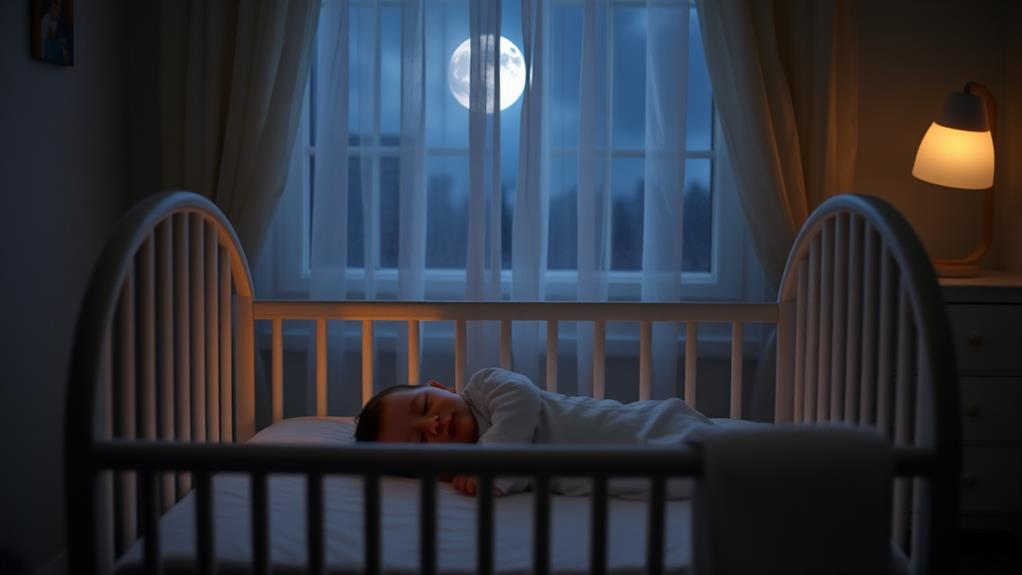
When you look at your baby's sleep patterns, you'll notice they differ significantly from adult sleep cycles. Babies typically experience shorter sleep cycles, lasting about 50 to 60 minutes, compared to the 90 minutes most adults enjoy. This means your little one might wake up more frequently during the night, often leading to those adorable sleepy faces you can't resist.
In addition, babies spend a larger portion of their sleep time in REM (Rapid Eye Movement) sleep, which is essential for their brain development. This stage is where dreaming occurs, and it's marked by increased brain activity. You might find your baby twitching or making little noises—these are normal behaviors during this phase.
As babies grow, their sleep patterns will gradually shift. You'll notice longer stretches of sleep as they approach their first birthday.
While every child is unique, understanding these normal patterns helps you stay informed and prepared. It's completely normal for your baby to have a mix of light and deep sleep throughout the night.
Room Temperature Factors
The right room temperature plays a crucial role in your baby's sleep quality. Babies are more sensitive to temperature changes than adults, so keeping the room at a comfortable level is key.
Ideally, you want the room to be between 68°F and 72°F (20°C to 22°C). If it's too hot or too cold, your little one may wake up frequently or even sweat during sleep.
You might notice your baby sweating if the room feels stuffy or overly warm. This can lead to discomfort, which affects their ability to settle into a deep sleep.
On the other hand, if the room is too chilly, your baby may struggle to stay warm, causing them to wake up crying.
To find the right balance, consider using a fan or adjusting the thermostat. You can also use a thermometer to monitor the temperature.
Sleepwear and Bedding Choices
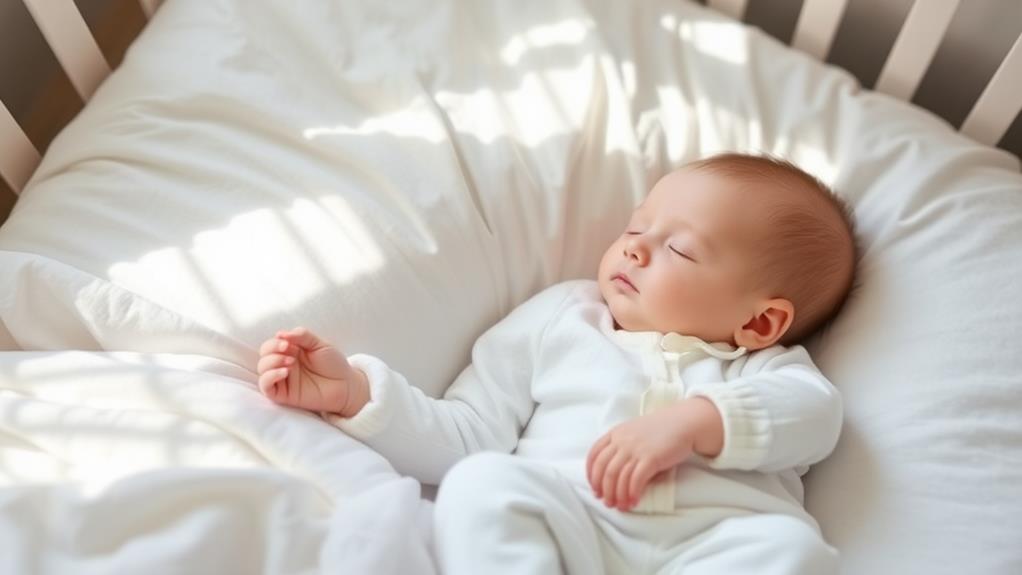
Room temperature isn't the only factor to consider for your baby's comfort during sleep; sleepwear and bedding choices are equally important. You want to make sure your little one stays cozy without overheating. Choose lightweight, breathable fabrics like cotton or bamboo for sleepwear. These materials help wick away moisture and allow air to circulate, keeping your baby cool and comfortable.
When it comes to bedding, opt for a fitted sheet and a lightweight blanket, if needed. Avoid heavy quilts or comforters, as these can trap heat and cause sweating. It's also wise to keep the crib free from pillows, stuffed animals, or extra bedding that could hinder airflow.
Additionally, consider the fit of your baby's sleepwear. Snug but not too tight is the way to go! You don't want clothing that restricts movement or causes your baby to sweat more than necessary.
Pay attention to your baby's cues, too; if they seem uncomfortable or sweaty, it might be time to adjust their sleepwear or bedding. By making thoughtful choices, you'll help ensure your baby gets the restful sleep they need, without waking up in a pool of sweat.
Hyperhidrosis in Infants
Hyperhidrosis, or excessive sweating, can sometimes affect infants, leaving parents concerned about their baby's comfort. This condition isn't uncommon, and it can happen regardless of the surrounding temperature. If you notice your little one sweating more than usual, it might just be hyperhidrosis.
This excessive sweating can occur during sleep or while they're awake, and it can affect various areas, like the head, neck, and hands. While it can be alarming, hyperhidrosis in infants is often harmless and doesn't indicate any underlying health issues. In many cases, it might be a temporary phase as your baby grows.
However, it's essential to monitor your baby's sweating patterns. If you notice that the sweating is excessive or if it accompanies other unusual behaviors, it's a good idea to talk to your pediatrician. They can help determine if it's just hyperhidrosis or if there's something more to consider.
In the meantime, ensure your baby is comfortable by dressing them in breathable fabrics and keeping their sleep environment at a suitable temperature.
You'll find that most infants with hyperhidrosis can lead happy, healthy lives without any significant concerns.
Illness and Fever Symptoms
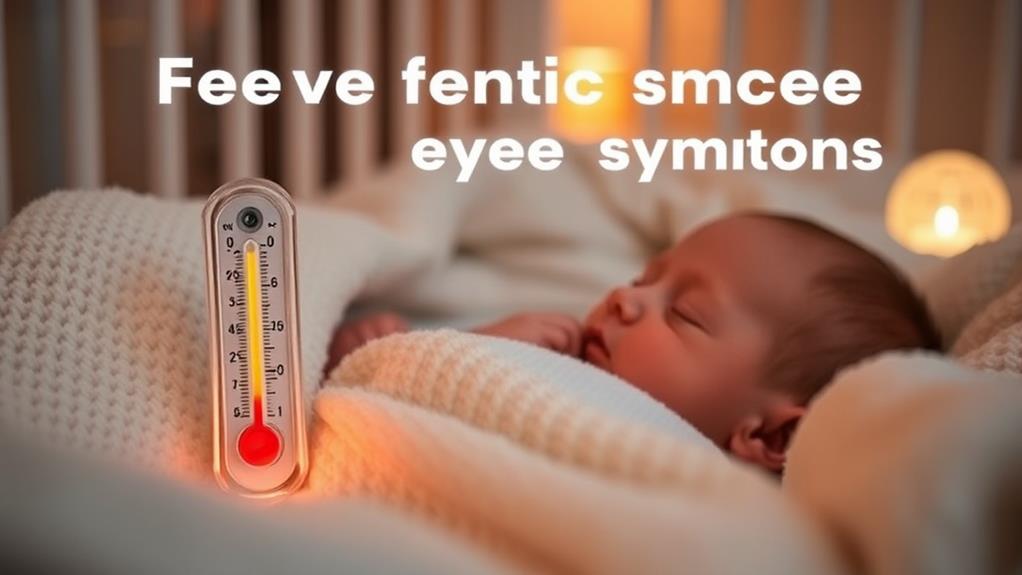
When your baby sweats during sleep, it can sometimes signal an underlying illness or fever. If your little one feels warm to the touch or has a higher-than-normal temperature, this sweating might be a response to their body working hard to fight off an infection.
Common illnesses like colds, flu, or ear infections can cause fever, leading to excess perspiration as the body regulates its temperature.
You'll want to keep an eye out for other symptoms, too. Is your baby unusually fussy, refusing to eat, or showing signs of lethargy? These can also indicate that something's not quite right.
If your baby seems to be sweating excessively or has a fever above 100.4°F (38°C), it's essential to check in with your pediatrician. They can help determine if your baby needs further evaluation or treatment.
Growth Spurts and Sweating
Sweating during sleep isn't always linked to illness; it can also be a normal part of your baby's growth process. When your little one goes through a growth spurt, their body works overtime, which can lead to increased sweating.
During these phases, your baby might be growing taller or gaining weight, and their metabolism speeds up. This heightened activity can naturally cause them to sweat more, even while they're tucked in bed.
You might notice your baby waking up damp or with a slightly clammy forehead. While it can be concerning, remember that this is usually a temporary phase and perfectly normal.
Growth spurts can happen at various times, often around 2-3 weeks, 6 months, and even during toddler years.
During these times, make sure your baby's sleeping environment is comfortable and not too warm. A well-ventilated room can help regulate their temperature.
If you see other signs of discomfort alongside excessive sweating, like difficulty breathing or unusual fussiness, it's a good idea to consult your pediatrician.
But if it's just sweating, it's likely just another sign that your baby is growing up!
Sleep Position Impacts
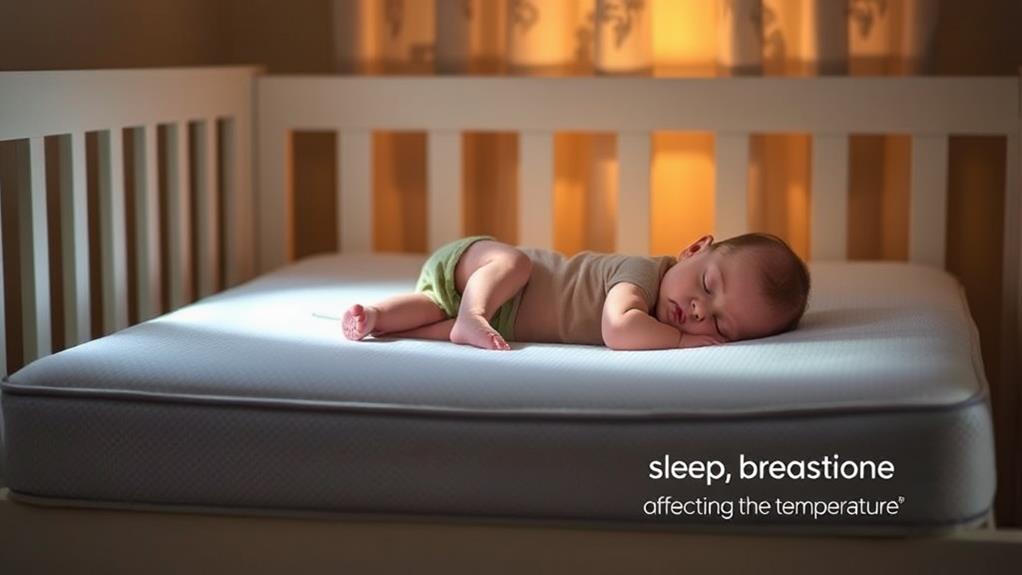
The way your baby sleeps can significantly impact their sweating during the night. If your little one prefers to sleep on their stomach, they might experience increased sweating. This position can trap heat against the mattress, causing them to feel warmer.
On the other hand, sleeping on their back is generally safer and allows for better air circulation. However, it's essential to ensure the room temperature is comfortable, as even back sleepers can overheat.
Side sleeping is another position you might notice. It can help reduce sweating, but be cautious about how you position their arms and legs. If they're too bundled up or tucked in tightly, it can lead to overheating.
When it comes to sleepwear, keep it lightweight and breathable, regardless of their sleep position.
Always pay attention to the room's temperature and your baby's comfort. If you notice excessive sweating, consider adjusting their sleep position or clothing. Monitoring these factors can help you create a more comfortable sleep environment for your baby, ensuring peaceful nights for both of you.
Overactive Sweat Glands
Overactive sweat glands can be a common reason for your baby sweating while they sleep. These glands, known as sweat glands, are responsible for regulating body temperature through perspiration. In some babies, these glands might be more active than usual, leading to excess sweating, especially during sleep.
If your little one is sweating a lot at night, it could be due to their immature sweat glands. Babies often have underdeveloped systems that are still learning to balance temperature regulation. As they grow, this usually improves, and excessive sweating tends to decrease.
You might notice this sweating more during warmer months or if your baby is bundled up in too many layers. It's essential to ensure that your baby's sleep environment is comfortable, ideally around 68-72°F (20-22°C). Dressing them in lightweight, breathable fabrics can also help manage sweat levels.
While overactive sweat glands are often harmless, keep an eye on your baby. If the sweating seems excessive or is accompanied by other concerning symptoms, such as fever or changes in behavior, consulting a pediatrician is always a good idea. They can provide the best guidance for your baby's health.
Teething and Discomfort
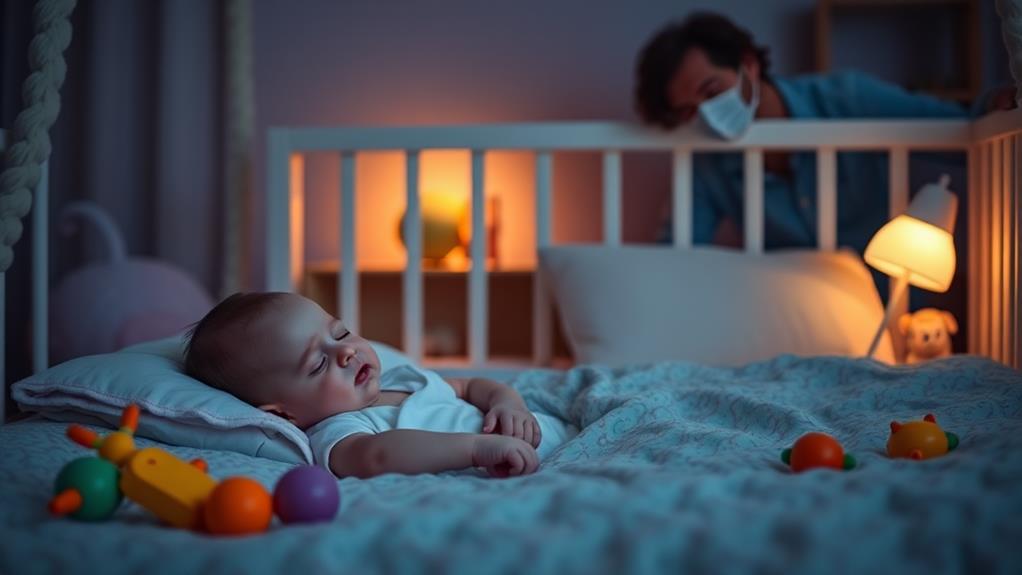
As your baby grows, teething can introduce new challenges that may contribute to sweating during sleep. When those tiny teeth start pushing through the gums, it can cause discomfort and pain, making it hard for your little one to settle down.
Teething often leads to fussiness, which can disrupt their sleep cycle, causing them to sweat more than usual. You might notice that your baby's cheeks are rosy and their saliva production increases during this time.
These changes can lead to restlessness, and as they struggle to find a comfortable position, sweating becomes more prominent. The combination of discomfort and the body's natural response to pain can elevate their temperature, even if they don't have a fever.
It's essential to keep an eye on your baby's overall behavior. If they seem more irritable than usual and sweat excessively, it might be worth exploring soothing remedies.
Gentle teething toys can provide relief, and keeping your baby cool and comfortable at night can help minimize sweating. Remember, teething is a natural process, and while it can be tough, it won't last forever.
Allergies and Skin Reactions
Allergies can create a range of uncomfortable reactions in babies, leading to excessive sweating during sleep. When your little one is allergic to something, like a food, pet dander, or even certain fabrics, their body might respond with skin reactions.
These can include rashes, hives, or eczema, which can irritate their skin and cause them to sweat more than usual, especially at night. You might notice your baby waking up damp or uncomfortable, and this could be linked to an allergic reaction.
Sometimes, the sweating is a way for their body to cool down when it's trying to fight off allergens. If you suspect allergies, pay attention to any other signs, like itching or redness.
It's important to keep an eye on these symptoms. If the sweating persists or if you see more severe reactions, like swelling or breathing difficulties, don't hesitate to talk to your pediatrician.
They can help identify potential allergens and recommend the best course of action. Remember, knowing what triggers your baby's allergies can make a big difference in their comfort and sleep quality.
Respiratory Issues to Consider
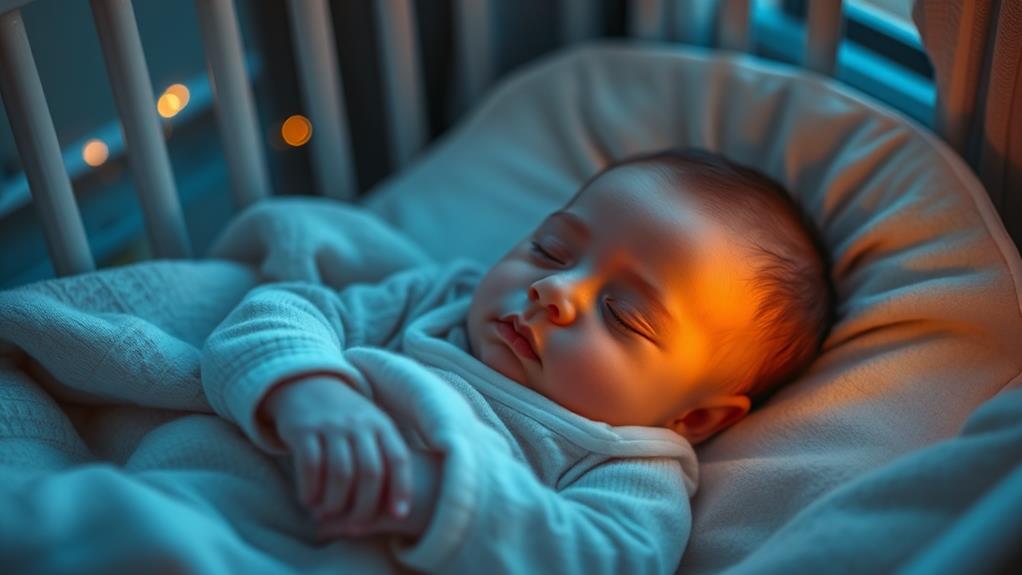
Respiratory issues can significantly impact your baby's sleep, and excessive sweating might be a symptom to watch for. If your little one has trouble breathing or sounds wheezy during sleep, it's essential to pay attention. Conditions like asthma or respiratory infections can cause your baby to work harder to breathe, leading to discomfort and sweating.
You might notice that your baby breathes faster or has a persistent cough. These symptoms often accompany respiratory problems and can disrupt sleep patterns. Allergies can also play a role, as they can cause nasal congestion and make breathing more difficult, especially at night.
If you suspect that respiratory issues are the cause of your baby's sweating, observe their breathing patterns and listen for any unusual sounds. Keeping their sleeping environment clean and free from allergens can help.
However, if the sweating persists or if your baby shows signs of distress, like rapid breathing or a bluish tint to their skin, it's crucial to consult a healthcare professional. Early intervention can make a significant difference, ensuring your baby gets the restful sleep they need.
Genetic Factors to Examine
Your baby's genetic makeup can play a significant role in how they regulate body temperature and sweat during sleep. Some babies inherit traits that affect their sweat glands, which can cause them to sweat more than others. This might be simply a quirk of their genetics rather than a cause for concern.
For instance, if one parent tends to sweat more during sleep, it's possible that your baby may have inherited that tendency. Additionally, certain genetic conditions can impact how the body manages temperature, leading to increased sweating. Conditions like familial dysautonomia or other autonomic nervous system disorders may be factors to consider if your baby's sweating seems excessive or unusual.
It's also worth noting that some babies have a naturally higher metabolic rate, which can lead to increased body heat and, consequently, more sweating. This isn't necessarily a problem; it could just be a part of who they are.
As you observe your baby's patterns, keep in mind that genetics can shape their sleep experience in unique ways. Understanding these factors helps you feel more informed and assured as you navigate your baby's development.
When to Seek Medical Advice
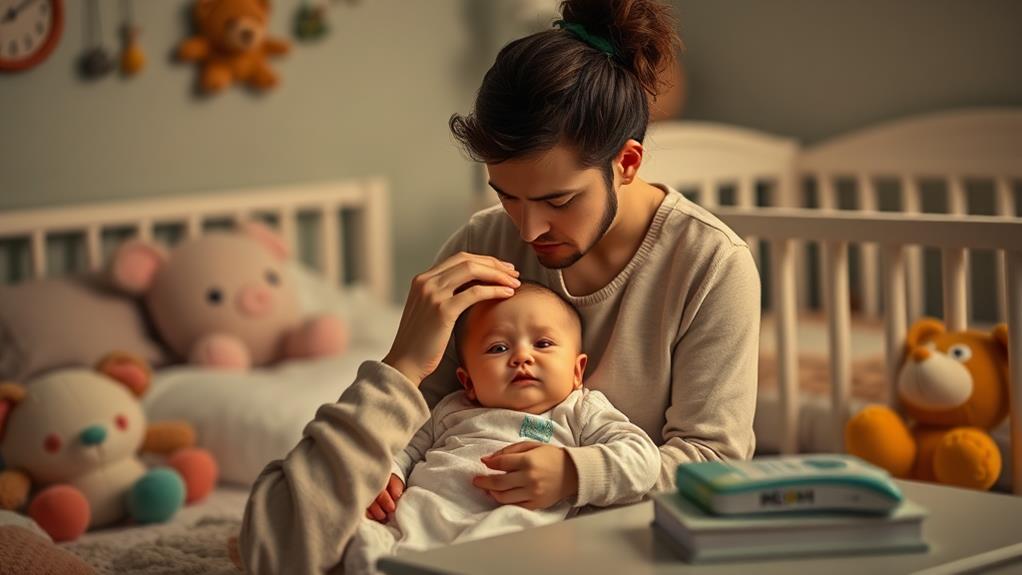
While understanding genetic factors can provide insight into your baby's sweating patterns, it's important to recognize when those patterns may warrant medical attention. If your baby sweats excessively during sleep, especially if they seem uncomfortable or are waking up frequently, it could be a sign of an underlying issue.
You should also keep an eye out for other symptoms. If your baby has a fever, rapid breathing, or unusual irritability along with sweating, it's a good idea to consult your pediatrician.
Additionally, if the sweating persists even in cooler environments or seems to worsen over time, don't hesitate to reach out for professional advice.
Sometimes, excessive sweating can be linked to conditions like sleep apnea or hyperhidrosis. Trust your instincts—if you feel something's off, it's better to ask.
Remember, your pediatrician is there to help you navigate these concerns and provide peace of mind. Always prioritize your child's well-being, and don't shy away from seeking support when you need it.
After all, a little clarity can go a long way in ensuring your baby's health and comfort during those precious sleeping hours.
